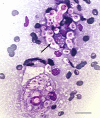Mesenteric cryptococcal granuloma in a dog caused by Cryptococcus neoformans var. grubii
- PMID: 30101089
- PMCID: PMC6067525
- DOI: 10.2147/VMRR.S35490
Mesenteric cryptococcal granuloma in a dog caused by Cryptococcus neoformans var. grubii
Abstract
Although cryptococcosis is usually associated with respiratory and neurologic signs in domestic species (such as sneeze, cough, nasal discharge, seizures, ataxia), clinical manifestations of the disease may be more subtle and nonspecific. A 3-year-old male castrated Boxer dog presented with a history of chronic vomiting, diarrhea, weight loss, and lethargy. At no time had respiratory or neurologic signs been noted by the owners or the primary care veterinarian. Palpation of an abdominal mass revealed an atypical lesion location: a large (16 × 9 × 7 cm) mass at the root of the mesentery. Diagnosis was achieved through cytology of this mass and a positive serologic Cryptococcus capsular antigen titer; polymerase chain reaction was utilized for speciation of the abdominal isolate as Cryptococcus neoformans variety grubii. The animal was euthanized due to poor prognosis. After necropsy and histopathologic analysis, the mesenteric mass and associated lymph nodes were identified as large fungal granulomas. This is a rare manifestation of cryptococcosis, involving several visceral organs, with no remaining evidence of the route of entry of the organism. As prompt diagnosis of mycotic illness is paramount to successful management, this case indicates that cryptococcal infection should be considered as a differential diagnosis in dogs with gastrointestinal signs and lymphadenopathy. The protean nature of cryptococcosis is discussed within the context of a brief review of emerging and unresolved issues in pathogenesis.
Keywords: Cryptococcus gattii; granuloma; lymphadenitis.
Conflict of interest statement
Disclosure The authors have received no financial support for the research, authorship, and/or publication of this article and declare no potential conflicts of interest.
Figures



Similar articles
-
Cryptococcus neoformans var. grubii-Induced Arthritis with Encephalitic Dissemination in a Dog and Review of Published Literature.Mycopathologia. 2016 Aug;181(7-8):595-601. doi: 10.1007/s11046-016-0009-4. Epub 2016 Apr 28. Mycopathologia. 2016. PMID: 27126588 Review.
-
Diagnosis of systemic cryptococcosis by fecal cytology in a dog.Vet Clin Pathol. 2005 Dec;34(4):409-12. doi: 10.1111/j.1939-165x.2005.tb00071.x. Vet Clin Pathol. 2005. PMID: 16270270
-
Disseminated, histologically confirmed Cryptococcus spp infection in a domestic ferret.J Am Vet Med Assoc. 2010 Apr 1;236(7):770-4. doi: 10.2460/javma.236.7.770. J Am Vet Med Assoc. 2010. PMID: 20367045
-
In vitro antifungal susceptibility profiles and genotypes of 308 clinical and environmental isolates of Cryptococcus neoformans var. grubii and Cryptococcus gattii serotype B from north-western India.J Med Microbiol. 2011 Jul;60(Pt 7):961-967. doi: 10.1099/jmm.0.029025-0. Epub 2011 Mar 10. J Med Microbiol. 2011. PMID: 21393452
-
[Cryptococcosis caused by Cryptococcus neoformans var. Gattii. A case associated with acquired immunodeficiency syndrome (AIDS) in Kinshasa, Zaire].Med Trop (Mars). 1992 Oct-Dec;52(4):435-8. Med Trop (Mars). 1992. PMID: 1494313 Review. French.
Cited by
-
Multiple intra-abdominal fungal granulomas caused by Scedosporium apiospermum effectively treated with voriconazole in a Golden Retriever.Med Mycol Case Rep. 2023 Sep 28;42:100611. doi: 10.1016/j.mmcr.2023.100611. eCollection 2023 Dec. Med Mycol Case Rep. 2023. PMID: 37808222 Free PMC article.
References
-
- McGill S, Malik R, Saul N, et al. Cryptococcosis in domestic animals in Western Australia: a retrospective study from 1995–2006. Med Mycol. 2009;47(6):625–639. - PubMed
-
- Lester SJ, Kowalewich NJ, Bartlett KH, Krockenberger MB, Fairfax TM, Malik R. Clinicopathologic features of an unusual outbreak of cryptococcosis in dogs, cats, ferrets, and a bird: 38 cases (Jan–Jul 2003) J Am Vet Med Assoc. 2004;225(11):1716–1722. - PubMed
-
- Trivedi SR, Sykes JE, Cannon MS, et al. Clinical features and epidemiology of cryptococcosis in cats and dogs in California: 93 cases (1988–2010) J Am Vet Med Assoc. 2011;239(3):357–369. - PubMed
-
- Malik R, Dill-Macky E, Martin P, Wigney DI, Muir DB, Love DN. Cryptococcosis in dogs: a retrospective study of 20 consecutive cases. J Med Vet Mycol. 1995;33(5):291–297. - PubMed
-
- O’Brien CR, Krockenberger MB, Wigney DI, Martin P, Malik R. Retrospective study of feline and canine cryptococcosis in Australia from 1981 to 2001: 195 cases. Med Mycol. 2004;42(5):449–460. - PubMed
Publication types
LinkOut - more resources
Full Text Sources
Research Materials
